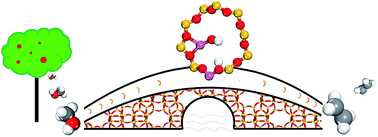Brønsted/Lewis acid sites synergistically promote the initial C–C bond formation in the MTO reaction†
Abstract
The methanol-to-olefin (MTO) reaction is an active field of research due to conflicting mechanistic proposals for the initial carbon–carbon (C–C) bond formation. Herein, a new methane–formaldehyde pathway, a Lewis acid site combined with a Brønsted acid site in zeolite catalysts can readily activate dimethyl ether (DME) to form ethene, is identified theoretically. The mechanism involves a hydride transfer from Al–OCH3 on the Lewis acid site to the methyl group of the protonated methanol molecule on the adjacent Brønsted acid site leading to synchronous formation of methane and Al–COH2+ (which can be considered as formaldehyde (HCHO) adsorbed on the Al3+ Lewis acid sites). The strong electrophilic character of the Al–COH2+ intermediate can strongly accelerate the C–C bond formation with CH4, as indicated by the significant decrease of activation barriers in the rate-determining-step of the catalytic processes. These results highlight a synergy of extra-framework aluminum (EFAl) Lewis and Brønsted sites in zeolite catalysts that facilitates initial C–C bond formation in the initiation step of the MTO reaction via the Al–COH2+ intermediate.



 Please wait while we load your content...
Please wait while we load your content...